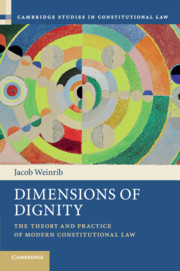Crossref Citations
This Book has been
cited by the following publications. This list is generated based on data provided by Crossref.
Weinrib, Jacob
2016.
When Trumps Clash: Dworkin and the Doctrine of Proportionality.
SSRN Electronic Journal,
Miller, Sarah Clark
2017.
Reconsidering Dignity Relationally.
Ethics and Social Welfare,
Vol. 11,
Issue. 2,
p.
108.
Weinrib, Jacob
2017.
When Trumps Clash: Dworkin and the Doctrine of Proportionality.
Ratio Juris,
Vol. 30,
Issue. 3,
p.
341.
Lemmens, Koen
2018.
Handbook of Human Dignity in Europe.
p.
1.
Stewart, Hamish
2019.
A Juridical Right to Lie.
Kantian Review,
Vol. 24,
Issue. 3,
p.
465.
Weinrib, Jacob
2019.
Human Dignity and Autonomy.
SSRN Electronic Journal ,
Leijten, Ingrid
2019.
The right to minimum subsistence and property protection under the ECHR: Never the twain shall meet?.
European Journal of Social Security,
Vol. 21,
Issue. 4,
p.
307.
Weinrib, Jacob
2019.
The Principles of Constitutional Reform.
Kantian Review,
Vol. 24,
Issue. 4,
p.
631.
Riley, Stephen
2019.
Human Dignity as a Sui Generis Principle.
Ratio Juris,
Vol. 32,
Issue. 4,
p.
439.
Liss, Ryan
2019.
Whose Right is it Anyway? Adjudicating Charter Rights in the Context of Multiple Rightsholders.
SSRN Electronic Journal ,
Lemmens, Koen
2019.
Handbook of Human Dignity in Europe.
p.
93.
Gehring, Markus W.
2020.
Europe's Second Constitution.
Morris, Douglas
2020.
Legal Sabotage.
Huber, Jakob
2020.
Putting proximity in its place.
Contemporary Political Theory,
Vol. 19,
Issue. 3,
p.
341.
STONE SWEET, ALEC
and
RYAN, CLARE
2020.
Kant, cosmopolitanism and systems of constitutional justice in Europe and beyond.
Global Constitutionalism,
Vol. 9,
Issue. 3,
p.
562.
Koch Mikalsen, Kjartan
2020.
The Irrelevance of History: In Defense of a Pure Functionalist Theory of Territorial Jurisdiction.
Ratio Juris,
Vol. 33,
Issue. 3,
p.
291.
Bilchitz, David
2021.
Fundamental Rights and the Legal Obligations of Business.
Rodiņa, Anita
2021.
Constitutional Court as a guardian of the Latvian legal system.
Strani pravni zivot,
p.
579.
Zylberman, Ariel
2022.
Moral rights without balancing.
Philosophical Studies,
Vol. 179,
Issue. 2,
p.
549.
Mikalsen, Kjartan
2024.
Political Legitimacy: What’s Wrong with the Power-Liability View?.
Moral Philosophy and Politics,
Vol. 11,
Issue. 1,
p.
29.



